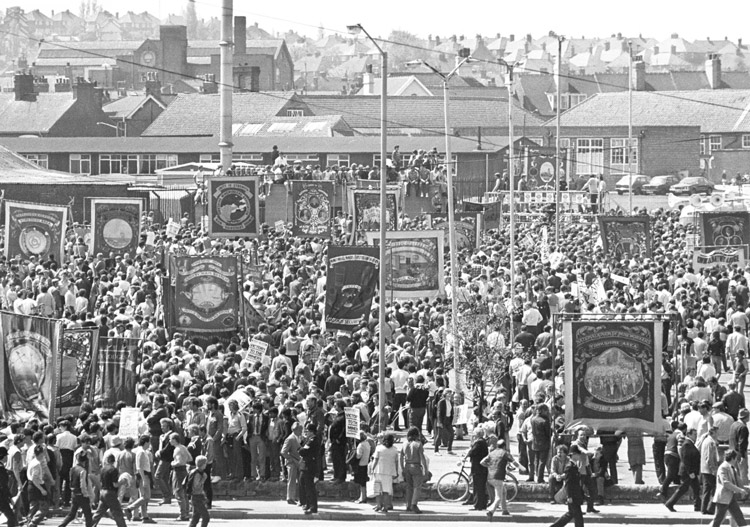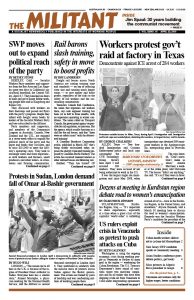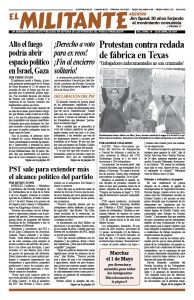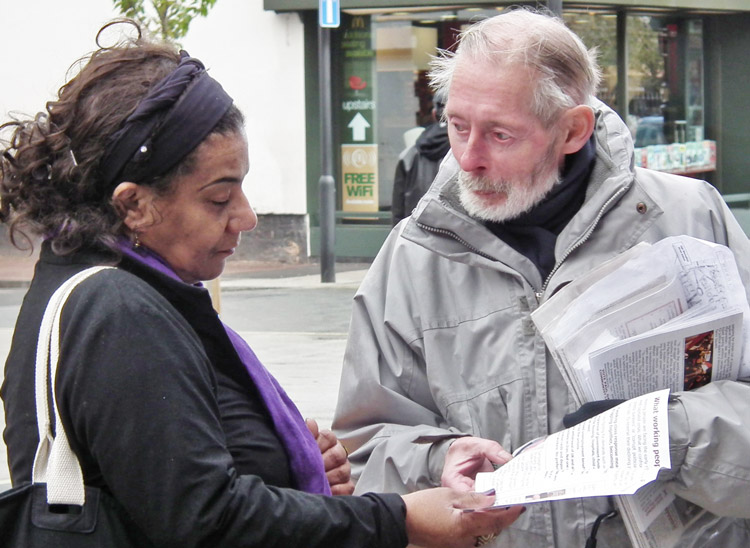LONDON — “Jim Spaul came to recognize more is needed to emancipate the working class than militant trade unionism, as important as that is,” Communist League Central Committee member Jonathan Silberman told a March 31 meeting here to celebrate 76-year-old Spaul’s political life. He died March 6.
Spaul, a 30-year veteran of the League, was an underground coal miner for 36 years. He was involved in four major national fights by the National Union of Mineworkers, including the yearlong strike by 150,000 miners in 1984-85.
In the wake of that battle Spaul joined the Communist League, having become convinced the liberation of working people “requires a political struggle to overturn capitalist rule,” Silberman said.
The 50 people at the meeting included members and supporters of the Communist League, others who had worked with Spaul, nine of his family members, and some who didn’t know Spaul but wanted to learn about his union and political activities and about his party. They came from the U.K., Norway, France, Belgium and the U.S. Julio Pujol, political counselor from the Cuban Embassy in London, also attended.
An attractive display of some 35 photos and newspaper clippings was set up, illustrating three decades of the class struggle and the Communist League’s activity while Spaul was a member. Participants at the meeting could see there how Spaul “responded to the big political questions of the day, how he stuck to the communist politics he was won to, how he served in whatever capacity he was asked and how well he carried through his political activity,” Silberman said. Spaul shouldered a range of responsibilities for the League, including as an elected member of its Central Committee for a number of years.
Won through internationalism
Paul Mailhot, who spoke on behalf of the leadership of the Socialist Workers Party from the U.S., described how in 1989 Spaul and fellow coal miner and League member Paul Galloway went to Virginia to extend solidarity to striking Pittston coal miners there. “Jim Spaul was attracted to and won to the communist movement through internationalism,” Mailhot said. “He saw workers’ struggles in the U.K. in common with the fight of working people in other parts of the world.”

“His recruitment was realized through an international collaboration, one the Communist League and the Socialist Workers Party can be proud of,” Sandler said.
Pat Nixon, who organizes the print project leadership responsible for production of Pathfinder books, described in a message how she met Spaul — who hadn’t yet met the League — when she came to the U.K. as part of a delegation of women miners and other workers from the U.S. in 1987. After attending the Yorkshire Miners Gala, a union-organized celebration of thousands of miners, they traveled together by bus to the Kellingley mine in West Yorkshire where Spaul worked. She met Spaul on the bus, and he was “immediately interested in the working class perspective of the Militant and bought a subscription,” Nixon said.
She sent him material about the fight against the cop frame-up of SWP member Mark Curtis, who was facing trumped-up charges of rape and burglary. Curtis had been arrested and beaten by Des Moines, Iowa, cops in the midst of his involvement in a fight to defend immigrant co-workers at the meatpacking plant where he worked.
Spaul understood through his own experience in the “Justice for Mineworkers” campaign that “an injury to one was an injury to all.” He immediately turned to campaign for Curtis among fellow workers.
In a tribute to Spaul sent to the meeting, Curtis wrote, “I learned what ‘Workingmen of all countries, unite!’ really means through men like Jim Spaul. Jim showed why coal miners like him would stand with meatpackers like me even though we were thousands of miles apart.”
Jim’s life stamped by world politics
“Giant developments were shaping world politics and they were having an impact on all thinking workers” when Spaul was attracted to communist politics, Silberman said. He pointed to the combined impact of the 1987 stock market crash, the openings scored by Cuban-Angolan-Namibian forces that inflicted a crushing defeat on apartheid South Africa’s invading army in 1988; and the shattering of the counterrevolutionary Stalinist regimes in central and eastern Europe in 1989.
The display featured how Spaul responded to these developments. He joined a solidarity brigade to learn firsthand about Cuba’s socialist revolution in 1993. His union paper, the Yorkshire Miner, ran his review of US Hands Off the Mideast by Fidel Castro and Ricardo Alarcón, a book Pathfinder rushed to print in 1990 to respond to Washington’s war propaganda preparing for their invasion of Iraq.
“Jim was inspired by the African National Congress’ successful struggle to overthrow the hated apartheid regime,” Alan Harris, a long-time leader of the Communist League in the U.K., wrote to the meeting, “and was proud to be identified with South African miners who played an important role in the victory.”
Communist League leaders Caroline Bellamy and Andrés Mendoza described the impact that Spaul’s contribution to the communist movement had on them. Bellamy had joined Spaul on a 1993 solidarity brigade to Cuba before she joined the CL. She recalled him telling her “as soon as he got back from the brigade, he’d be changing suitcases and flying to the U.S. to bring solidarity to a miners’ fight there. I was struck by the breadth and international character of what the Communist League was doing, and also Jim’s lack of self-promotion as he spoke.”
Andrés Mendoza, organizer of the League’s London branch, said what struck him as a new recruit 10 years ago was that Spaul was a “party man.” “His discipline had an impact on me,” Mendoza said. “He would always help you to see that it was how you carry out a task that was more important than just getting it done.”
In recent years Spaul had taken on responsibilities ranging from organizing the League’s finances to the distribution of the Militant throughout the U.K. and into Europe, Africa and the Middle East. Mendoza described how keen Spaul had been with the door-knocking campaigning of the League. As he talked to fellow workers Spaul would point to Are They Rich Because They’re Smart? by SWP National Secretary Jack Barnes and ask what they thought of the book’s final paragraph — For the working class “the greatest of all battles in the years ahead” is “the battle to throw off the self-image the rulers teach us, and recognize that we are capable of taking power and organizing society.”
After the program, participants stayed on to enjoy a buffet and continue discussion. “I found out a lot about fights before my time,” said Oliver Jones, a young worker from Manchester who has been joining in the League’s campaigning.
Jim’s son Jamie, who had sent a message describing how he knew his father had “kept within the front line of union fights,” talked about how he would often accompany Spaul to miners’ rallies. He said that through the meeting he had learned “more about the extent to which Jim was part of a broader international effort.” Spaul’s 17-year-old grandson Jack, who took a bundle of Militants with an article about Spaul’s political life, said he appreciated the meeting and learned a great deal about Cuba’s revolution and workers’ battles in the U.S.
An appeal for funds to the League’s work in honor of Jim Spaul raised £2,590 ($3,380).


